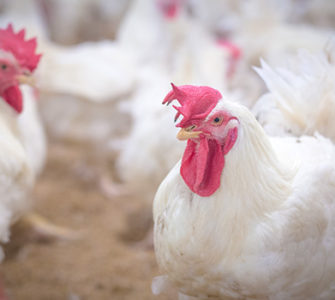Breed may impact broiler response to Salmonella infection
Broiler breed could have an effect on immune response to Salmonella exposure, a study at the University of Arkansas suggests.
The work compared the response to a Salmonella Typhimurium challenge of a breed that reaches market weight around 42 days of age to a slower-growing breed that reaches the same weight parameter around 63 days of age, explained Shawna Weimer, PhD, director of the Center for Food Animal Wellbeing.
“Many research groups have looked at those environmental and management factors, both within certain systems and across certain systems, for decades…but the factors that contribute to the prevalence of Salmonella inside of the bird are less well-known and less defined,” Weimer told Poultry Health Today.
‘Surprising’ immune system differences
The study used a total of 312 birds from the two broiler breeds, looking at performance, immune response, gut morphology, gut microbiome and behavior. Salmonella challenge took place at 14 days of age by oral gavage, after all the birds had initially shared the same pen before being moved into isolators.
Differences in antibody levels were detected following exposure to S. Typhimurium, one of the most prevalent foodborne pathogens in poultry. The faster-growing breed showed earlier immunoglobulin G production, she said, suggesting earlier immune development.
“The immune response was definitely surprising,” she noted. “I don’t think anyone has really directly compared the circulating immunoglobulins of two different breeds of broilers.”
Longer study needed
The initial work lasted for 24 days, Weimer explained, but the next step may be to carry out a similar study that goes all the way to market weight, to provide further insight into the immune response and behaviors of the two breeds.
“We think that maybe delineating the differences in the natural and pathogen-challenged phenotype of broilers will be useful for the broiler industry at large, but maybe for geneticists for selection or nutritionists or even just day-to-day grow-out managers,” she added.
Posted on October 6, 2022

















